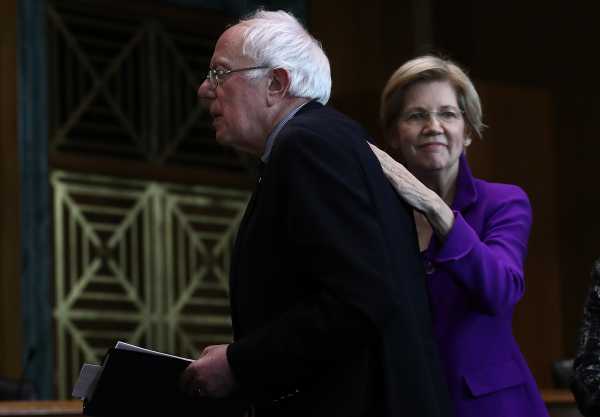
$32 trillion.
That is how much federal spending would increase over 10 years under Bernie Sanders’s Medicare-for-all bill, according to a brand-new estimate from the libertarian-leaning Mercatus Center at George Mason University.
Before you question the source (like Sanders did), you should know the left-leaning Urban Institute came up with the exact same number in 2016.
It sure sounds like a lot of money, and conservatives hopped all over the figure on Monday morning. But there are a lot of ways to think about $32 trillion — and one might be that it’s actually kind of a bargain.
Mercatus is projecting a $32 trillion increase in federal spending, above current projected government expenditures, from 2022 to 2031.
In terms of overall health care spending in the United States over the same period, however, they are actually projecting a slight reduction.
There is the rub. The federal government is going to spend a lot more money on health care, but the country is going to spend about the same.
“Lower spending is driven by lower provider payment rates, drug savings, and administrative cost savings,” Yevgeniy Feyman at the right-leaning Manhattan Institute told me. “It’s not clear to what extent those savings are politically feasible, and socially beneficial.”
(One concern is whether cuts to prescription drug spending would discourage medical innovation. It’s simply hard to know — Mercatus projects a $61 billion drop in drug spending in one year, but there would still be hundreds of billions of dollars spent annually on medications.)
When you consider a universal single-payer program would 1) cover every single American, eliminating uninsurance and 2) provide much more robust benefits, covering more services than get covered right now, then it starts to look like a good deal.
More people covered. More services covered. Same price, more or less.
The Mercatus Center bakes in some assumptions that could vary the actual cost quite a bit. For example, its scholars assume (as the Sanders bill dictates) that hospitals and doctors would be paid at Medicare rates, a cut from private insurance rates but an increase from Medicaid rates. If the real payment rate were different, it could affect the price tag significantly.
Still, this seems like a reasonable estimate from a group that we would expect to be pretty skeptical of single payer — and it still looks like kind of a good deal.
This is where politics enters into the mix. Conservatives are going to recite that large-sounding cost as often as they can. They were already jumping on it Monday morning. Many Americans still hold real reservations about making Big Government any bigger.
Single-payer supporters are going to have to come up with a persuasive case that, yes, the federal government is going to spend more, but overall spending won’t go up. Taxes are going to rise for somebody, but many or even most Americans could end up saving money on their premiums or on out-of-pocket costs.
We still haven’t seen the fine print on financing, and that will be a big part of this debate. We shouldn’t minimize that. There will be winners and losers, as there always are in health care reform.
It could be a winnable case, given evolving attitudes about a person’s right to health care. But polling shows many people’s opinions on this are still malleable. Persuasion is necessary.
But setting the politics aside, a closer look at these new estimates reveals “$32 trillion” isn’t quite as much as you might think.
This story appears in VoxCare, a newsletter from Vox on the latest twists and turns in America’s health care debate. Sign up to get VoxCare in your inbox along with more health care stats and news.
vox-mark
VoxCare
Subscribe
By signing up, you agree to our Privacy Policy and European users agree to the data transfer policy.
For more newsletters, check out our newsletters page.
Join the conversation
Are you interested in more discussions around health care policy? Join our Facebook community for conversation and updates.
Sourse: vox.com






